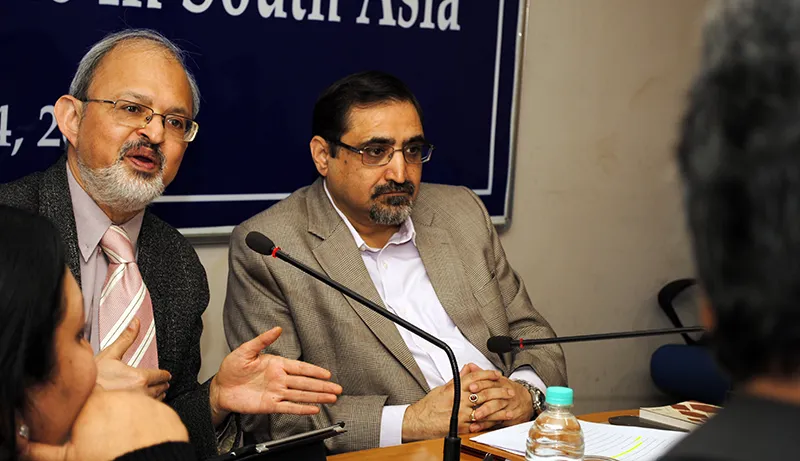-
CENTRES
Progammes & Centres
Location
To check non-tariff barriers in the south Asian region, India being the largest economy in the region must take the lead, but other partners must extend cooperation and come together on a common platform.

"The biggest Non-Tariff Barrier (NTB) arises from the local, regional political economy", according to Mr. Sunjoy Joshi, Director, Observer Research Foundation.
Speaking at a workshop on non tariff barriers in South Asia, held on March 4 at Observer Research Foundation, Delhi, he said that existing rules and procedures that act as barriers can be changed, but the problem lies in their implementation.
Moderating the discussion, Mr. Ashok Dhar, Director of ORF Kolkata, said that the need of the hour is a blue print for action. He made two personal observations. The first was his concern pertaining to future generations which according to him cannot be held hostage to the present suppressive regime of NTBs. Second, he talked about how not even four per cent of exports go from India to the extended region, including Afghanistan and Myanmar. Further, he pointed out that with many NTBs in place, informal trade escalates. India as the largest economy in the region, he asserted, must take the lead, but other partners must extend cooperation and come together on a common platform.
Dr. Geetanjali Nataraj, Senior Fellow, ORF, highlighted the broad issues that exist in the region. In South Asia, intra-regional trade is only five per cent as compared to the 50 per cent trade in EU, 40 per cent in NAFTA (North American Free Trade Agreement) and 26 per cent in ASEAN. Although there is an integrated will to trade in the global economy, the same will lacks within the South Asian region. "Infrastructure bottlenecks are a hurdle as well,." she said. She then listed the non-economic reasons for miniscule trade in the region, which are lack of trust, security concerns, domestic lobbying, policy inconsistency, and overall uncertainty in the trading community. She suggested certain short term measures such as elimination of all tariffs in SAFTA (South Asian Free Trade Area), setting up of labs for quality checks along the borders to avoid delays currently faced by traders, signing of MOUs between customs authorities in the region, and information dissemination, among traders.
Mr. Joseph George from the Consumer Unity and Trust Society (CUTS), Rajsthan, drew the audience attention towards the semantics of NTBs, i.e. how to classify NTBs and study the impacts of NTBs by quantifying them. He also pointed out the disturbing reality of transaction costs being accumulated due to systemic obstacles such as transportation problems, high fees, service costs, licensing etc. These issues persist despite geographical proximity.
Mr. George classified NTBs into policy related and infrastructure related ones, and said that standardised ancillary agreements are needed in the region, along with economies of scale for logistical entities, and anti-corruption measures at interface points. He stressed on the need to rope in industry for infrastructural development.
Dr. Murali Kallummal, Associate Professor, Centre for WTO Studies, New Delhi said, "Market access is the core issue." He said that TBs and NTBs are the main instruments for regulating the market. Dr. Kallummal highlighted the need for SME representation in discussions to know the lowest standard existing in any market.
Mr. Chandra Kumar Ghimire, Consul General, Consulate General of Nepal, Kolkata agreed with Mr. Joshi on the importance of local politics, and focused on two points -- harnessing potential and promoting trade. He pitched for the removal of transit fees on herbal products, and test certificates required for ready made garments from Nepal. He criticised the import-export relations between Nepal and India in the pharmaceuticals domain. He raised the issue of connectivity as well.
Mr. Mahbub Hassan Saleh, Dy High Commissioner of Bangladesh, Delhi brought to table a new approach, i.e. of mindset as a huge NTB. On the logistics part of it, he stressed the need for motor vehicle agreements, connectivity (including power grid connectivity), agriculture, energy transit access, etc.
Ms. Jayshree Sengupta, Senior Fellow, ORF suggested a futuristic framework, and laid emphasis on trade in services. She said that SARSO (South Asian Regional Standards Organisation)-SAARC (South Asian Association of Regional Cooperation) standards need to be organised in order to coordinate on NTBs. She advocated the removal of NTBs, which she said would promote vertical integration, enable cross-border supply chains thereby attracting FDI and creating jobs for the youth. She suggested depoliticising the process of NTB removal. She also pointed out the existence of financial NTBs and the need for addressing the same.
Mr. Pranav Kumar, Director, International Policy & Trade, Confederation of Indian Industries (CII), provided an industry perspective on NTBs in South Asia. He said that investment plays an extremely crucial role in trade, and that trade and investment cannot be put into mutually exclusive baskets. He cited the example of issues in trade deficit, which can be solved by investments.
(This report is prepared by Tarini Mahajan, Research Intern, Observer Research Foundation, Delhi)
The views expressed above belong to the author(s). ORF research and analyses now available on Telegram! Click here to access our curated content — blogs, longforms and interviews.